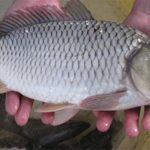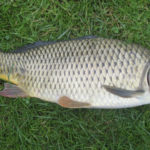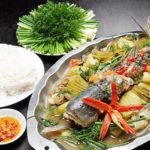In Traditional Chinese Medicine, carp are known as “li yu” and are believed to have a sweet and neutral taste. Carp have long been used as a medicinal herb in traditional medicine, treating various ailments such as edema, abdominal distension, jaundice, and cough caused by rebellious qi.
From a modern scientific perspective, carp are considered a nutrient-rich food source. According to nutritional analysis, 100g of carp meat contains approximately 17.3g of protein, 5.1g of fat, 25mg of calcium, 175mg of phosphorus, and 1.6mg of iron – all essential micronutrients for the body.
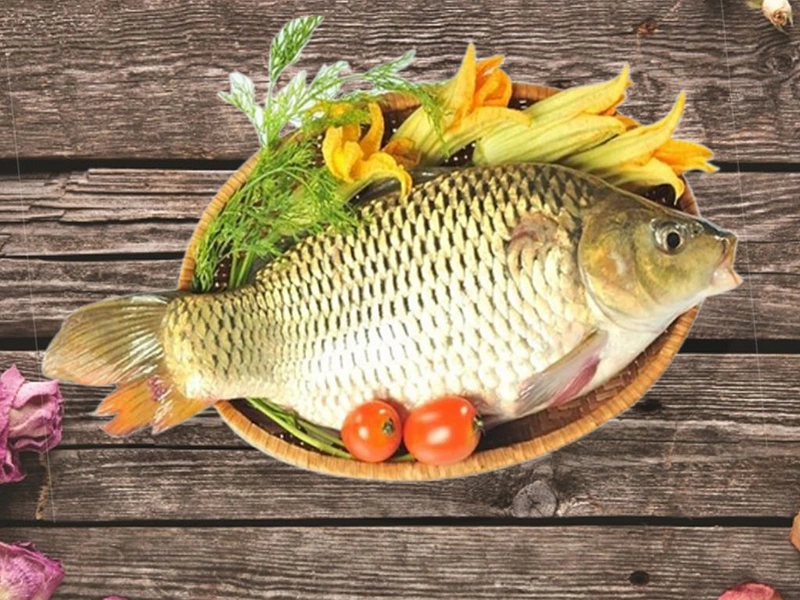
Additionally, carp provide important free amino acids such as glutamic acid, glycine, and histidine, which contribute to the natural sweetness and characteristic flavor of the fish. Carp are also a nutritious food source, rich in omega-3 and eicosapentaenoic acid (EPA). These nutrients help prevent atherosclerosis, reduce blood fat, and lower the risk of cancer…
In terms of vitamin content, 100g of carp meat can provide approximately 20 IU of vitamin A, 400μg of vitamin B1, 80μg of vitamin B2, 2.0-3.1mg of niacin, and 0.15mg of vitamin C, effectively supporting metabolic processes and boosting immunity.
The benefits of carp don’t stop there. Carp meat also contains digestive enzymes such as protease A, B, and C, which aid in protein absorption and breakdown, benefiting the digestive system, especially for pregnant women and those recovering from illness or surgery.
Due to these characteristics, carp is not only a popular ingredient in folk cuisine but also a valuable source of nutrition suitable for all ages, including adults, children, and pregnant women.
1. Benefits of Carp for Pregnant Women
Rich Source of Nutrition for Pregnant Women
Carp is abundant in high-quality protein and essential minerals and vitamins, which are crucial for the development of the fetus. With its rich nutrient content, carp helps provide energy and supports the metabolic processes of pregnant women.
Helps Reduce Edema During Pregnancy
Starting from the fifth or sixth month of pregnancy, many women experience swelling in their hands and feet. Carp has a mild diuretic effect, which can help alleviate this condition. Combining carp with adzuki beans enhances the diuretic effect and provides even better results.
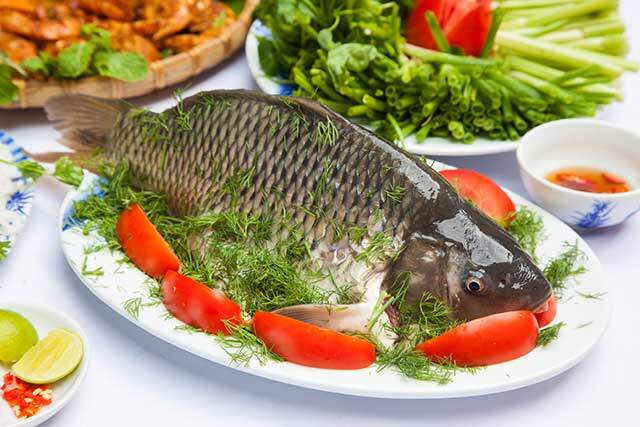
Prevents Amniotic Fluid Leakage
In the early stages of pregnancy, some pregnant women may experience slight amniotic fluid leakage due to emotional changes, falls, or strong impacts. A feeling of heaviness in the lower abdomen or restlessness of the fetus could be signs to watch out for. In traditional folk remedies, eating carp is believed to naturally support the improvement of this condition.
However, to ensure the safety of both mother and child, it is always advisable to consult a specialized obstetrician directly regarding any unusual symptoms.
Furthermore, including carp in the diet during pregnancy contributes to the development of the fetus’s brain and nervous system. The presence of nutrients such as omega-3, lutein, zinc, and selenium in carp also helps reduce the risk of congenital disabilities in infants.
2. Precautions for Pregnant Women When Eating Carp
Avoid Eating Fish on an Empty Stomach
When the stomach is empty, the body absorbs purine from fish more efficiently, leading to increased uric acid levels, which can damage tissues and is the primary cause of gout. Therefore, pregnant women should refrain from consuming fish when hungry to minimize this risk.
Do Not Eat Fish When Experiencing a Cough or Taking Medication
For individuals with a persistent cough, consuming fish, especially certain types that are more allergenic, can exacerbate the condition. It is best to abstain from fish during the treatment period to avoid irritation and adverse reactions.
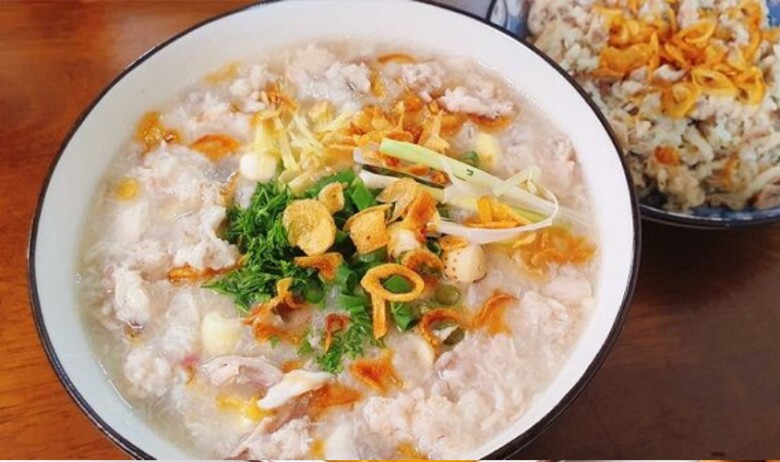
Never Eat Raw or Undercooked Fish
Raw fish is a host to various parasites such as worms and flukes. If these parasites enter the body, they can cause liver damage and even increase the risk of liver cancer. Pregnant women and children are the most vulnerable to these parasites, so it is crucial only to consume thoroughly cooked fish.
Do Not Consume Fish Bile
Fish bile, especially from species such as grass carp and common carp, may contain the toxic substance tetrodotoxin, which can severely affect the nervous system. Poisoning from fish bile can lead to fatigue, breathlessness, altered consciousness, and even life-threatening situations. Therefore, when preparing fish, it is essential to completely remove and discard the bile and internal organs, thoroughly cleaning the fish before cooking.
3. How to Cook Carp Porridge for Pregnant Women
Best Time to Eat Carp Porridge
The ideal period for pregnant women to consume carp porridge is during the first trimester, specifically the first three months of pregnancy. This is when the vital organs of the fetus begin to form. Eating carp porridge during this time ensures a sufficient supply of essential nutrients, effectively supporting the initial development of the baby.
Carp porridge is versatile and can be incorporated into the diet at various times throughout the day.
– Breakfast: Eating carp porridge in the morning aids digestion, reduces bloating, and provides energy, making it an excellent choice after a long night without nutrition.
– Morning or afternoon snack: Pregnant women can enjoy this as a light snack to boost their energy levels without feeling overly full.
– Evening, before bedtime: A warm bowl of carp porridge relaxes the body, aids sleep, and provides sufficient nutrition without feeling heavy.
Carp porridge doesn’t have to be eaten daily. It can be enjoyed 2-3 times a week. Varying the cooking methods and combining it with other ingredients such as adzuki beans, lotus seeds, and carrots adds diversity to the diet, making it tasty and preventing monotony.
How to Cook Delicious Carp and Green Bean Porridge
Ingredients:
– 1 fresh carp (approximately 700-800g)
– 100g shelled green beans
– 50g glutinous rice
– 100g rice
– 1-2 ginger roots
– A bunch of dill and scallions
– Shallots, minced garlic
– Seasonings: salt, pepper, fish sauce, seasoning powder, MSG, sugar, cooking oil
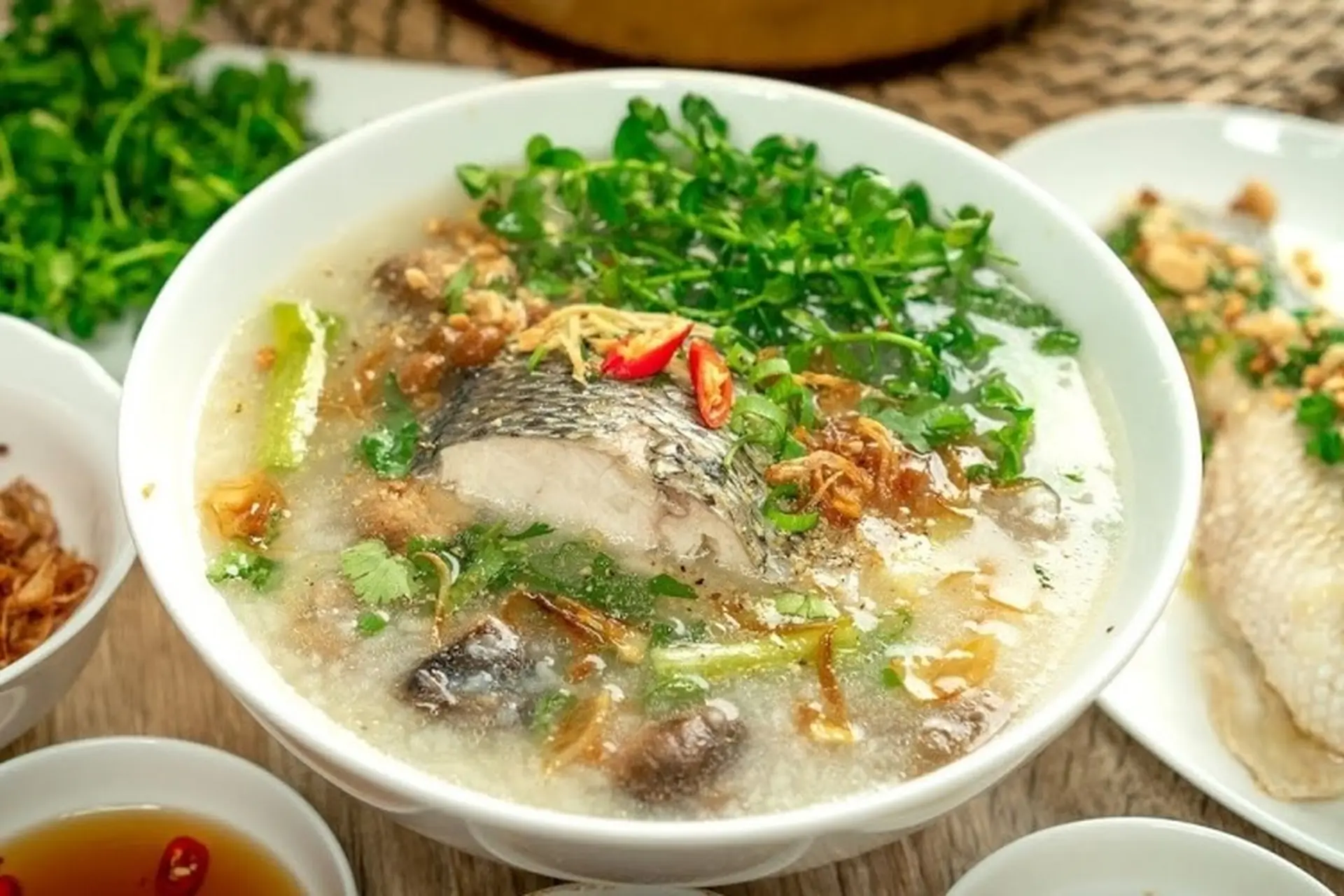
Instructions:
– Carp preparation: Rinse the carp thoroughly. You can use salt and ginger to gently rub and reduce the fishy smell. Boil a pot of water with a few slices of ginger, then add the carp and cook until done. Adding a little dill to the pot enhances the aroma of the fish. Once cooked, remove the carp, let it cool, and separate the meat from the bones.
– Cooking the porridge: Rinse the glutinous rice, rice, and green beans. Put them in a pot, add water (you can use the carp broth for a natural sweet taste), and simmer over low heat for about 1-1.5 hours until the porridge is soft and creamy. During cooking, add water if the porridge becomes too dry, and stir occasionally to prevent sticking.
– Sautéing the fish: Marinate the fish meat with salt, pepper, and fish sauce for about 10 minutes. Heat a pan, add a little cooking oil, and sauté the minced shallots and garlic until fragrant. Then, add the marinated fish and gently stir-fry until the fish is cooked and fragrant.
– Finalizing the porridge: When the porridge is soft, season with salt, seasoning powder, fish sauce, and MSG to taste. Add the sautéed fish to the porridge, stirring gently to combine. Finally, sprinkle with chopped scallions and dill, and turn off the heat.
How Crispy Carp Differs From Regular Carp
Crispy carp is taking the culinary world by storm, and it’s easy to see why. This unique fish is a delightful alternative to its common carp cousin, offering a whole new world of delicious dining possibilities. Today, we invite you to join us as we explore the wonders of this crisp, flavorful fish and uncover what sets it apart from the ordinary.
























